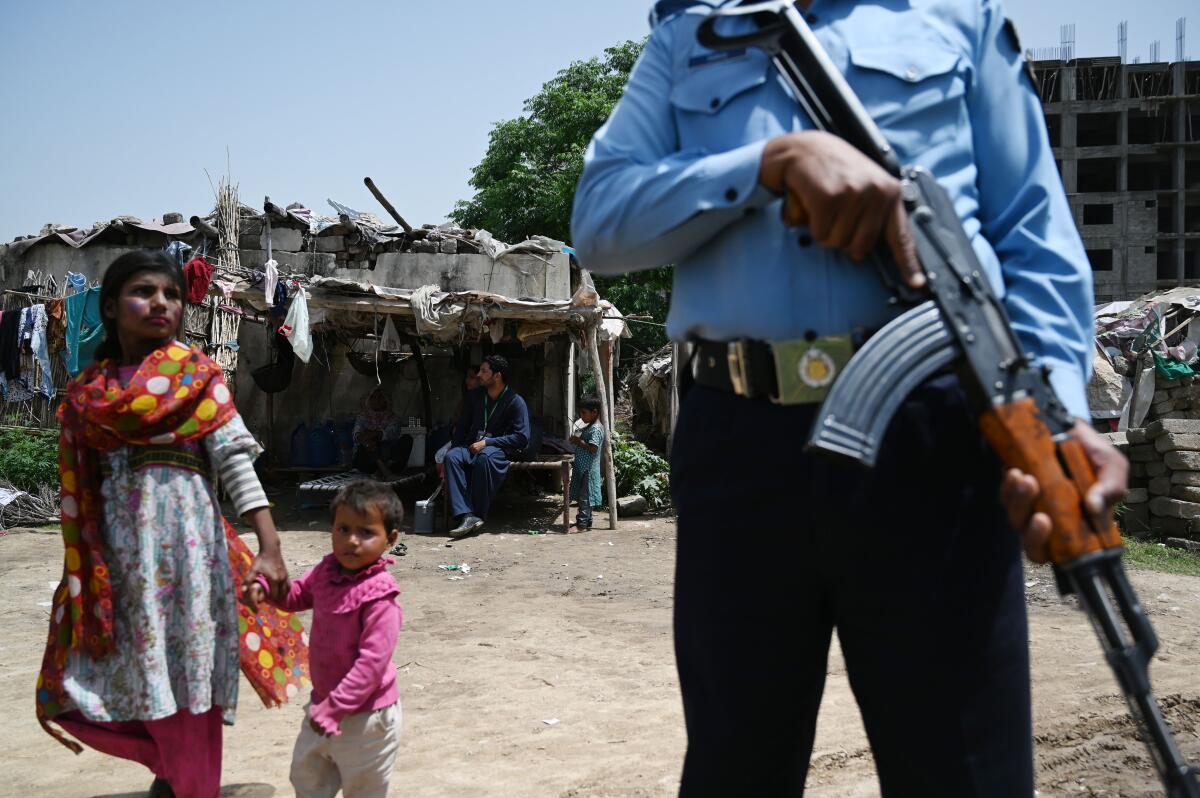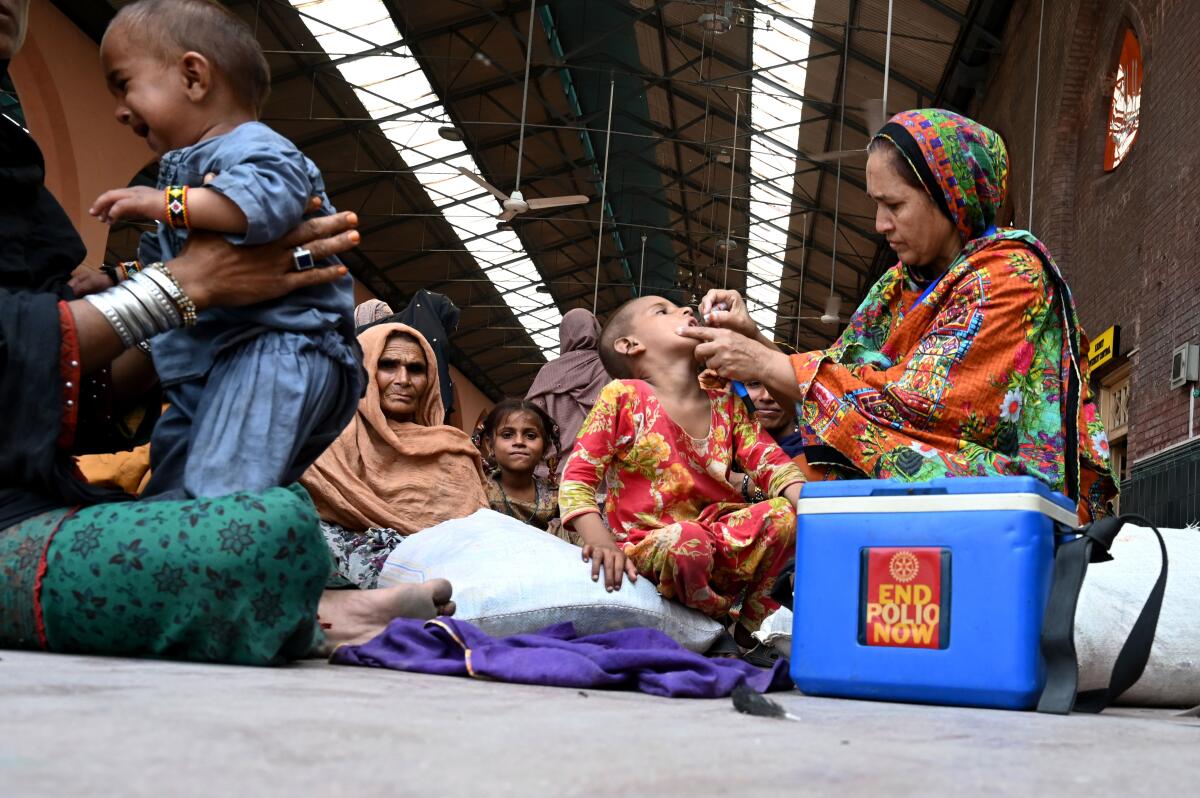Polio was nearly extinct. Then the anti-vaxx movement reached Pakistan

- Share via
BANNU, Pakistan — An anti-vaccination movement rooted in suspicions of modern medicine. Unsubstantiated rumors fueled by social media. Children infected with a disease that had been all but wiped out.
Polio is making a troubling comeback in Pakistan, and it is being driven by some of the same forces spreading measles in the United States.
Two years after health officials declared they were on the verge of eradicating the crippling childhood disease from Pakistan, one of the last countries where it remains endemic, at least 58 children here have tested positive for the virus since January.
That is nearly five times the total of all of last year, and the most in a calendar year since 2014 — a major setback for a $1-billion-a-year global eradication campaign.
Some 2 million Pakistani households have refused immunizations for children since April, when reports circulated on television channels, Facebook and Twitter that children had fallen ill after a vaccination drive at a school in the northern city of Peshawar.
None of those adverse reactions were serious enough to require hospitalization, according to health officials. But the rumors revived long-standing myths about the dangers of vaccinations in Pakistan that the decades-long eradication effort has fought to dispel.
Opponents of the Pakistani government are also using the vaccinations as a political tool to put pressure on the new prime minister, Imran Khan.
Here in dusty Bannu, center of an impoverished northern district of more than 1 million people, some traders and small retailers recently threatened to boycott an upcoming round of vaccinations if authorities didn’t withdraw plans for a new sales tax.
“The new taxation system for retailers is like economic murder of our children,” said Saleem Rehman, president of a shopkeepers association. “The polio virus can disable a child and will not kill him, but our children will die of hunger if we surrender to the government’s new taxes.”
Rehman was wrong about the virus — which attacks the central nervous system and causes paralysis that can be life-threatening — but his view resonates in northwest Pakistan, a longtime hotbed of insurgent violence where state institutions have been slow to take root.
Three-quarters of the new polio cases have been found here in Khyber Pakhtunkhwa province and the adjacent tribal belt along the border with Afghanistan, the world’s last major corridor of polio transmission. Afghanistan has recorded 13 cases this year and is the only other country where the disease continues to infect children.
Pakistani health officials have been baffled by the idea that parents would risk exposing their children to the virus in order to make a political statement.
“It’s a joke,” said a frustrated Aziz Memon, national chairman of the PolioPlus program in Pakistan led by the charity Rotary International. “But these are just blackmailing tactics. The government is taking care of this in a serious way.”
The resurgence of the virus has embarrassed Khan, who pledged to make polio eradication a “topmost priority” and launched a new communication strategy — backed by $10 million from international donors — to combat misinformation.
Memon said the government has replaced anti-polio officials in poor-performing districts and redoubled efforts to win over tribal and religious leaders, some of whom have denounced vaccinations as a Western plot to sterilize Muslims. At the request of Pakistani officials, Facebook said it deleted 36 posts for spreading vaccine misinformation “that had the potential to incite violence against health workers on the ground.”
In the next round of vaccinations, due to begin in November, officials have said they would distribute food rations in poor areas to rebuild public support.
While there is no cure for polio, the virus can be stamped out through regular doses of an oral vaccine. It was eliminated in the United States four decades ago.

The global effort, which includes UNICEF, foreign donors and international charities, has made huge strides from 2014, when nine countries recorded new infections.
In Pakistan, the door-to-door campaign to inoculate all children younger than 5 has been hampered by insecurity and lack of government authority in certain areas. This year alone, five polio workers have been killed.
Experts compared the struggle to that of Nigeria, which was thought to have eliminated the virus until an outbreak in 2016 in a state that had been overrun by the Boko Haram militant group. Nigeria has not recorded a new polio case in three years and is on track to be certified polio-free in 2020.
“All polio programs, when they get to the end, have to guard against complacency,” said Jay Wenger, director of polio eradication at the Bill & Melinda Gates Foundation.
In Pakistan, Wenger said, “the program has been successful enough that it’s almost eliminated the virus. If you look at all the issues people face, polio is not the biggest one. In a place where there are lots of issues and needs that are important, it’s easy to lose focus occasionally.”
Memon acknowledged that Pakistan started to lose focus on polio during last year’s election campaign, when top government ministers were replaced by caretakers. After Khan’s controversial victory, it took months to appoint new national and provincial polio coordinators.
Khan has launched an austerity drive to boost Pakistan’s flagging economy and announced plans to increase tax collection, moves that have weighed on onetime supporters.
Shah Wazir, president of the Bannu Chamber of Commerce and Industry, said he was a founding member of the polio eradication campaign in the city and personally visited houses to promote the vaccinations despite the opposition of Taliban militants who roamed the area.
But last month, he announced that his organization would boycott the next vaccination drive, because previous demonstrations against Khan’s fiscal policies haven’t worked.
“This was the only way to register protest against the government’s economic policies and seek the attention of the international community,” Shah Wazir, 60, said in an interview.
Other groups in the tribal area have also tried to condition their support for polio vaccinations on political demands. One tribe in South Waziristan announced it wanted the government to build roads to connect villages to schools. Another tribe in North Waziristan demanded compensation for houses damaged in Pakistani military operations against militants.
Officials said they wouldn’t negotiate with such groups or administer vaccinations by force, relying instead on the information campaign and anti-poverty efforts.
“We hope that with these changes, things move in the right direction,” Memon said. “We are heading into the low transmission season in November and December. If we are able to do a few good rounds of vaccinations, we will be able to halt the virus.”
Special correspondent Ali reported from Bannu and Times staff writer Bengali from Singapore.
More to Read
Sign up for Essential California
The most important California stories and recommendations in your inbox every morning.
You may occasionally receive promotional content from the Los Angeles Times.











